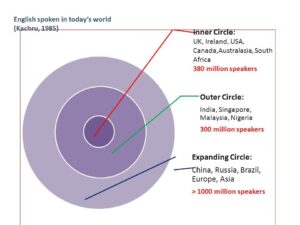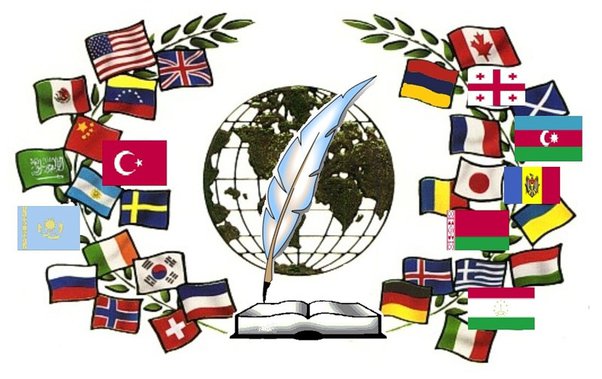There are more than 6000 languages spoken today, with 6% of the world’s languages being spoken by 94% of the world’s population.
English as a language didn’t exist 1500 years ago; however, today, it can be viewed as a global language. Even where English is not the primary language spoken, it is used as a common form of communication – Multilingualism is widespread worldwide today.
The origins of the language can be traced back to the language spoken by Anglo-Saxons from northern Germany. Viking invasions threatened the language between 800 AD and 1000 AD. The Vikings spoke Old Norse until King Alfred the Great revived the Anglo-Saxon Language, called Old English.
At that time, English didn’t have a status and was considered unworthy of use in any official capacity. The language disappeared for two hundred years while Norman French became the official language. English reemerged as a combination of English and French spoken at that time, overtaking Latin as the language of the bible. English took the status of Latin and became the dominant language in England. Military and commercial power further caused English to spread worldwide. Even though the British empire declined during the 20th century, English continued to spread and now holds the status of a lingua franca.
Over the last couple of years, internet use has increased rapidly, with over 40% of the world being connected. Approximately 51% of websites are in English, leading people to believe that if they can access this, they gain access to more information as the online world has no border. As a result of increased accessibility, the younger generation is forgetting their native tongue and switching to speaking English, endangering their native language.
Braj Kachru is an Indian-American linguist who proposed a model that classifies the core of the dynamics of the spread and the usage of English. According to Kachru’s Circles, the further away from the ‘core’ you get, the less power you have. English dominates communication at the core, and in the expanding circle, English is used for specific purposes, such as a medium of international communication and business. This is why countries in the outer and expanding circle strive to speak English, to get closer to the core and gain more power. [1]
The number of people learning and speaking English as a second language is much larger than those who speak it as a mother tongue. Due to this, English is marked by distinctive varieties, Pakistani English, Indian English, and Nigerian English, where there has been a historical colonial influence. These are often labeled as New Englishes or NVEs. Here, English exists alongside other local languages.
With this in mind, while English has its international status in its global spread, it still expresses the identities of its speakers showing that language will evolve inevitably. Especially a language like English, it is very free in the sense that people define language. As a result, ‘mixed languages’ or ‘creole languages’ are likely to arise from it, with its grammatical features being influenced by other languages.
Language use is associated with power and the view that it is beneficial to speak it. The British Empire, the industrial revolution, American commerce, trade, and media dominance have all driven English. After WW2, many countries lost their power. As an English-speaking country, the US was the most prominent Western influence, and through creating the UN, English gained its powerful status. To quote David Crystal, “It is English turning up at the right time during these last four hundred years or so which has produced the enormous cultural status that it has.”
We can say that English is a killer language. In the future, as the demands of English are higher, there will be a tendency that the outer circle will shift into the inner circle, and those in the expanding circle will move into the outer circle.
As the world advances and becomes more interconnected, countries shift to using English. An example of this is tourism. By catering to tourists in English, many countries are gaining wealth, publicity, and status and becoming more diverse. This increase in diversity could pressure the government to favour the lingua franca as it is more widely understood. Due to this significant ‘Western’ influence, countries will slowly lose their heritage.
On the flip side, people would be forced to learn the local language of the country that they are visiting so that they can communicate effectively (e.g., It would be hard to find someone who speaks English in the streets of China, as a tourist, you would be forced to learn a bit of the language to navigate). Despite this, if a country is strict, it can get left behind and isolated as the rest of the world progresses. It is our moral obligation to save our language and protect it from dying out.
No matter how strong English may be, it is important to cherish and preserve other languages due to their unique richness.
The notion of global English implicates a homogenizing process in which the dominant language overrides local languages…if the speakers allow it. Language evolves in the way that the users wish it to. Once you can speak a language, you can modify it, add to it, remove it, and edit it however you like. So, if non-native speakers refuse to give a specific language importance—the language becomes constrained despite its dominant role in worldwide business, navigation, science, and technology.
Reference:
- Valpa, A. (2020). Kachru Model ‘The Three Circles of English’. [online] Medium. Available at: https://agvalpa.medium.com/kachru-model-the-three-circles-of-english-b53b86e63d46 [Accessed 14 Apr. 2023].



Wow. So well written!